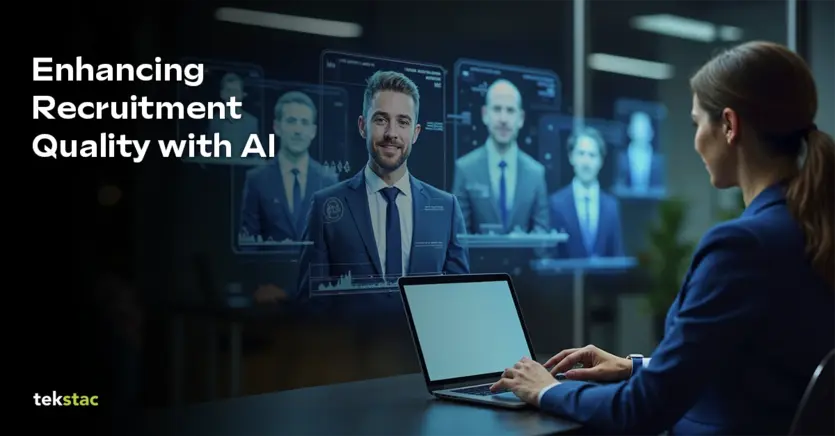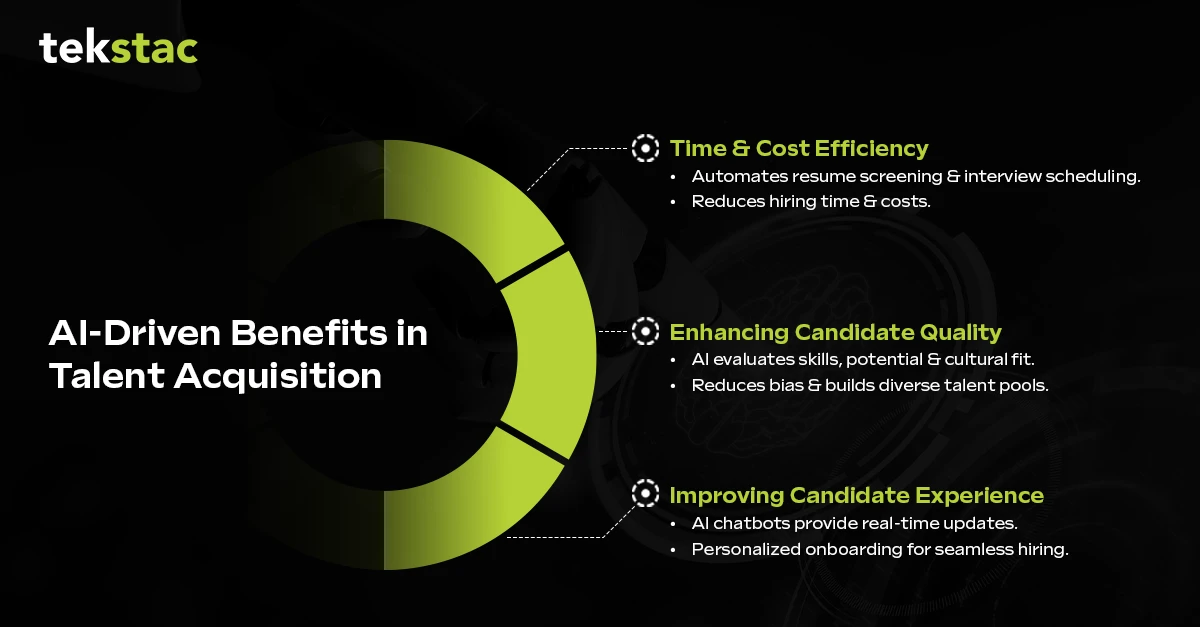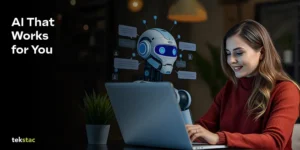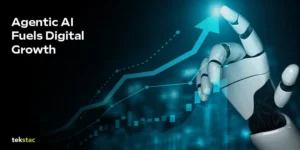The Future of Recruitment: Leveraging AI for Better Quality of Pre-Hire
December 12, 2024

AI is fundamentally changing how companies approach hiring, shaking up traditional methods and introducing faster, more effective solutions. With tools that deliver faster hiring outcomes, ensure precise candidate-job alignment, and streamline recruitment workflows, organizations can unlock new levels of efficiency and effectiveness.
However, as with any transformative innovation, adopting AI in recruitment comes with its own set of hurdles.
Recruiters today face a delicate balancing act: embracing these advanced tools while maintaining fairness and empathy in their decisions.
When done right, AI empowers businesses to identify top talent and foster inclusive workplaces. But amidst all the automation, the human touch remains a critical piece of the puzzle in talent acquisition.
The Current Landscape of AI in Recruitment
Artificial intelligence has shifted from being a futuristic idea to an everyday reality in hiring practices. By mid-2023, around 19% of HR leaders were testing out generative AI in their recruitment efforts. Fast forward to 2024, and that number has nearly doubled to 38%.
This remarkable growth underscores the shifting mindset toward AI in recruitment as an indispensable tool.
Why such a rapid surge?
It’s simple: AI eliminates tedious tasks, refines candidate analysis, and accelerates hiring timelines.
In today’s fast-paced talent market, where every second counts, AI in recruitment offers a clear advantage. It’s no longer a matter of “if” companies will adopt AI but rather “how” they can leverage it to maintain a competitive edge.
What Makes AI So Game-Changing?
AI is transforming recruitment by handling repetitive tasks like resume screening, candidate outreach, and success predictions.
Advanced tools operate around the clock, keeping candidates engaged while offering recruiters the insights needed to make smarter, data-driven decisions.
AI in recruitment isn’t about replacing recruiters—it’s about freeing them to focus on building genuine connections and making strategic decisions.
The result? A recruitment process that’s faster, smarter, and more impactful.
AI-Driven Benefits: Revolutionizing Talent Acquisition
AI offers undeniable advantages to organizations ready to embrace it. Let’s break these benefits into actionable insights for recruiters.

1. Time and Cost Efficiency
Hiring can feel like an endless cycle of screening resumes, scheduling interviews, and following up with candidates. AI automates these tasks, transforming the process entirely.
By pre-screening applicants and utilizing chatbots for real-time updates, AI in recruitment speeds up hiring while cutting costs.
This allows recruiters to zero in on what matters most—connecting with the right talent.
2. Enhancing Candidate Quality
AI tools dig deeper than traditional methods, evaluating not just skills but also potential and cultural fit. Advanced psychometric tests, for instance, measure cognitive abilities and personality traits to predict a candidate’s likelihood of success.
With AI in recruitment, organizations reduce unconscious bias and create diverse, high-quality talent pools. Data-driven insights ensure every candidate gets a fair shot, leveling the playing field in an unprecedented way.
3. Improving Candidate Experience
Lengthy or chaotic hiring processes often drive top candidates away. AI solves this by keeping candidates informed through chatbots and offering personalized onboarding experiences.
For example, AI in recruitment tailors onboarding plans to suit individual roles and preferences, creating a seamless and engaging start for new hires. This makes the hiring journey smooth and effective for everyone involved.
Challenges and Considerations: Navigating AI’s Limitations
Despite its benefits, AI isn’t without its limitations. Missteps can lead to inefficiencies or harm a company’s reputation.
1. Algorithmic Bias
AI is only as good as the data it learns from. Biased training data can lead to discriminatory outcomes, as seen with Amazon’s hiring tool that unintentionally favored male applicants.
To combat this, regular audits and diverse datasets are essential to ensure AI in recruitment promotes fairness and inclusivity.
2. Loss of Human Touch
AI lacks the human touch needed to build trust and meaningful connections between recruiters and candidates.
Over-relying on AI can make the hiring process feel cold and impersonal.
The solution?
Let AI manage repetitive tasks, freeing up recruiters to focus on interviews, negotiations, and fostering relationships—areas where human interaction makes all the difference.
3. Adoption Costs
AI tools typically come with high upfront costs and require significant training to implement effectively.
For smaller companies with irregular hiring needs, the return on investment might not make financial sense.
The solution?
Focus on adopting AI for specific, high-impact use cases where its benefits—like efficiency and accuracy-clearly outweigh the costs.
Future Trends: What Lies Ahead for AI in Recruitment
As technology continues to advance, its role in hiring is set to grow even further. Here’s a glimpse into what the future holds for recruitment and AI-driven processes:
Generative AI in Candidate Engagement
Generative AI is quickly becoming a powerful ally for recruiters, streamlining their work and enhancing connections with candidates.
From drafting compelling job descriptions to crafting personalized outreach emails, these tools are transforming how recruiters engage.
Tools like ChatGPT can analyze a job description alongside a candidate’s resume and provide a concise summary of why the individual is a strong match for the role.
Skills-First Hiring
The focus on degrees is fading, with skills taking center stage in hiring. LinkedIn data shows that removing degree requirements from job postings can expand talent pools by 36%.
Skills-based hiring not only broadens candidate pools but also encourages diversity, allowing companies to discover talent they might have previously overlooked.
AI-Powered Workforce Planning
AI is reshaping how companies plan for the future. It doesn’t just track labor market trends—it predicts them, giving organizations a clear advantage.
With workforce analytics, businesses can spot skills gap before they become problems and decide whether to upskill existing teams or hire fresh talent. It’s like having a crystal ball for smarter, faster decision-making.
Best Practices for AI Implementation in Recruitment
For organizations looking to embrace AI, the key to success is a thoughtful and strategic implementation.
Upskill Your Team
In today’s changing hiring environment, giving recruiters the tools to confidently work with AI isn’t just helpful—it’s essential. Companies are going beyond simple training to truly equip their teams with the skills they need to thrive in a tech-driven world.
Instead of spending hours on repetitive tasks like sorting resumes or scheduling interviews, recruiters can focus on meaningful conversations with candidates and finding the perfect fit for each role. That’s the power of blending human insight with smart technology.
It’s not about replacing the personal touch—it’s about enhancing it. Businesses that prioritize preparing their teams today are positioning themselves to excel in tomorrow’s competitive hiring market.
Adopt Ethical AI Practices
Transparency and accountability are key. Ethical AI ensures candidate data is handled responsibly and that algorithms are free from bias.
Measure Success
If you want to truly evaluate how AI is transforming recruitment, focus on the metrics that matter most:
- Time-to-fill: How quickly can you fill open positions?
- Candidate satisfaction: Are candidates happy with the hiring experience?
- Quality of hire: Are you consistently finding the right fit for each role?
These metrics provide real insights into AI’s effectiveness—whether it’s speeding up processes, improving the candidate experience, and ultimately helping you secure the best talent for your team.
Conclusion: Embracing the AI Revolution in Recruitment
AI is no longer just an addition to the recruitment process—it’s the backbone of modern hiring strategies. Its ability to simplify workflows, improve candidate quality, and boost efficiency makes it essential for organizations aiming to stay ahead in a competitive landscape.
However, the human touch remains irreplaceable. When AI’s strengths are combined with recruiter expertise, the hiring process becomes not just efficient but also inclusive and deeply personal.
The future of recruitment is here-smarter, faster, and more dynamic than ever. Are you ready to lead the change?





